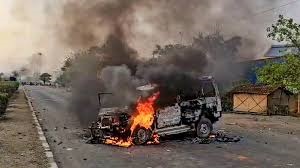Waqf properties have been the basis of religious and social activities of the Muslim community in India. But as soon as the Central Government implemented the Waqf (Amendment) Act, 2025, there was a stir in many states. This law provides for a renewed checking of walf boards’ transparency, digital register, review of reencies and a freshness of validity of possession. In states such as Bengal, where there have been irregular occupations in political patronage over Waqf properties for years, this law proved to be a danger bell. In protest, there were large -scale violent demonstrations in Murshidabad, Birbhum and South 24 Parganas districts between 8 and 13 April 2025. Rail services were stopped at Nimmatita station, National Highway 12 was blocked, and police vehicles were set on fire. Three people were killed, dozens of injured and more than 200 protesters were arrested in the violence. About 400 people migrated to Malda’s relief camps. These incidents have challenged the social and political stability of Bengal, far beyond the Waqf Act.
The protests that should have been within the limits of the law, how to turn into violence – this question should be asked not only by the protesters, but also by the governance system. The reports sent to the intelligence agencies of the Government of India and the Ministry of Home Affairs clearly mentions that Bangladeshi infiltrators have been found involved in the violence in Murshidabad and surrounding areas. These intruders have been living illegally in the border areas for years and have also captured several Waqf properties under the protection of local politicians. As soon as the process of digital survey and re -verification was announced, there was restlessness among these illegal occupants. According to the report, these elements provoked the protest, spread rumors on social media and created a land of violence by inciting religious sentiments. It was also observed that many such people participated in the demonstrations in these areas, whose citizenship is not certified. When people from across the border start challenging the law and the governance remains mute spectators, it becomes a question of sovereignty of the nation, not only internal security. Statements like the silence and sometimes sympathy of the Bengal government are working as ghee in this fire.
Chief Minister Mamata Banerjee termed this law as a conspiracy against Muslims and directly blamed the Central Government and the BJP for the violence. He even said that all this was “politically sponsored” and included BSF and central agencies. While the BJP’s side is exactly the opposite – according to him, this law is in the interest of Muslim society, because it is an essential step taken to end the corruption and unauthorized occupations that have been going on for years on Waqf properties. This entire controversy has given rise to confusion and apprehension among Muslim voters across the country. Organizations like AIMIM are also trying to surround both Trinamool and Center. Politics is at its peak on this issue – one aspect is calling it “attack on secularism” and the other is “protecting the property of the nation”. The common Muslim community is confused in this two -edged rhetoric, and those who are resorting to violence are basically exploiting this religious insecurity. It is the responsibility of political parties to make this subject a medium of logical dialogue rather than giving religious color, but unfortunately everyone’s eyes are only on the upcoming elections.
If this entire issue is being linked to any one political context, it is – the upcoming 2026 assembly elections in West Bengal. The Trinamool Congress has been dependent on the Muslim vote bank over the years and the interests associated with the wow properties control it to a great extent. This law fears Trinamool that a large population of Muslim society may be angry and BJP or other parties may benefit from it. Therefore, the government is raising strong opposition against this Act – but this protest is no longer limited to political rallies, it has reached road, stations and schools. At the same time, the BJP is moving towards polarization of Hindu votes by making it an issue of nationalism and transparency. In this equation, the actual debate of transparency, corruption, illegal occupation and social harmony of Waqf properties is being left behind. If this politics continues, then this issue will badly affect social harmony in the coming elections and will lead the political direction of the state to deep polarization.
It would be dangerous to avoid this violence in Bengal as “religious dissatisfaction” or “political response” only. This is a multi-faceted crisis-including infiltration, illegal occupation, political selfishness, administrative apathy and exploitation of public sentiments. To prevent this, it is necessary that both the Center and the state sides come out of political rhetoric and communicate the solution. The central government should ensure that the purpose and benefits of the Waqf Act reach the Muslim society properly and the propagation of any kind of fear cannot be spread through lies and rumors. At the same time, the state government should understand the priority of law and order rather than vote bank politics and keep a strong watch on every activity happening within the boundaries of the country. Law, faith and rights – The time has come to balance these three, otherwise the hidden hidden behind a small amendment can hurt the unity of the country. And then, the question will not be only with Bengal – but will be of the democratic future of the whole of India.
(The author is an independent columnist. Thoughts are private.)





